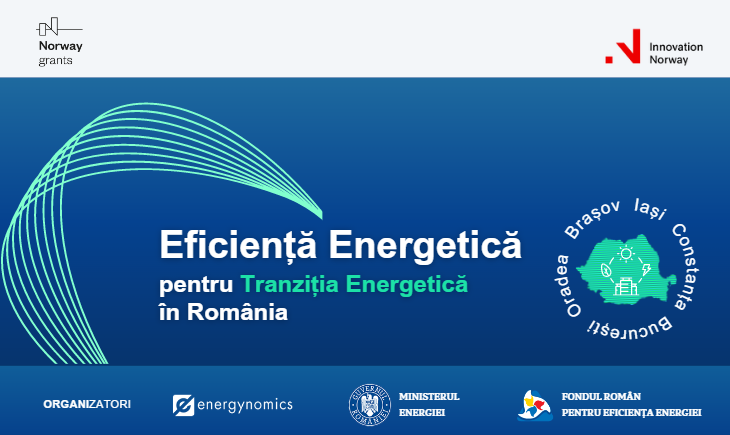From March to December 2023, the communication platform Energynomics, the Romanian Fund for Energy Efficiency – FREE and the Directorate for Energy Efficiency in the Romanian Ministry of Energy carried out the information campaign “Energy Efficiency for Energy Transition”. Specifically, we carried out four types of actions:
- public conferences
- specialized workshops
- Summer school for young people
- public communication
5 public conferences
More than just conferences, the events included training sessions by recognised experts and allowed for a high degree of interactivity between those present: professionals from technical departments of municipalities, local and county councils, boards, public utility companies, as well as energy managers, energy auditors, suppliers of solutions and equipment for energy efficiency measures and renewable energy production, financial experts, consultants, students. Access was free of charge and involved more than 130 people from Brasov, Oradea, Timisoara, Iasi and Bucharest.
The topics discussed were:
- Digitalization for successful companies
- Renewable integration solutions
- Encouraging prosumers through smart grid investments
- Technology response to new energy trends
- Green power generation
- Solutions for urban and inter-urban mobility
- Electric mobility and the necessary infrastructure
- District heating
- Building renovation
Energy efficiency and renewable energy training courses
The thematic workshops were delivered by three recognised experts in the field of energy efficiency.
Courses held by Dr. Andrei Ceclan, profesor, senior energy consultant presented case studies of opportunities and realized energy efficiency projects in industry and at the local level, focusing on key outcome indicators, including measured and verified impacts, financial and human resources committed, barriers and how to overcome them, and lessons learned
Courses held by Dr. Corneliu Rotaru, senior expert energy efficiency presented the basic concepts and guidelines of national and European policy in the field of energy transition and aims to increase the capacity of local authorities for the necessary actions and use of technologies for increasing energy efficiency and for the energy management of localities. It will address topics such as databases and digitalization, new cooperation mechanisms between TAUs and energy communities to reduce the costs of investment preparation, and contracting of energy services, as well as new approaches to identify energy efficiency solutions (e.g. decentralized generation, smart metering, cost allocators).
Courses held by Adrian Ghiță, Executive Director of the Romanian Fund for Energy Efficiency (FREE) presented the main funding mechanisms available at national level for projects proposing energy efficiency and renewable energy solutions. It will present the factors that influence project indicators and their relevance in increasing the chances of accessing several sources of funding in parallel, either separately or through the integration of a complex financing scheme.
Summer School
Beyond the formal instruction they receive in school or in internship programmes, young people need a general understanding of energy and the role the energy industry plays in society. This requires young people – high school, university students or recent graduates – to familiarise themselves with the main relevant institutions from an energy perspective and the dominant themes of the sector.
One response to these needs was the Summer School “Energy Efficiency, Renewables and Career Planning”. For five days, around 20 young people had the chance to meet 15 leading figures in the energy sector. From different perspectives, as built on 15 different career paths, the lecturers addressed topics such as the energy transition, energy efficiency, the role of renewables, energy independent buildings, energy financing or energy entrepreneurship. Each lecturer proposed an interactive moment, during which participants were part of the action.
Media campaign on renewable energy and energy efficiency
In order to disseminate the “Energy Efficiency for Energy Transition” campaign, a media planning strategy was implemented involving online publications (e.g. www.startupcafe.ro), banner campaigns and press releases, postings on Energynomics’ and partners’ Facebook and LinkedIn accounts.
The “Energy Efficiency for Energy Transition” information campaign was a project funded by Innovation Norway through Norwegian Grants 2014-2021.
The objective of the project was to increase the level of information and awareness of the general public, industry professionals and public authorities on energy efficiency and renewable energy. The Energy Efficiency for Energy Transition project started in March 2023 and was implemented by the end of the year. In order to achieve the proposed objective, the project will develop information, communication, and training activities to increase the level of expertise of energy practitioners and the level of empowerment of decision-makers in public authorities and companies in Romania. The proposed result is the contribution of the project actions to facilitate the improvement of the energy consumption behaviour of industrial and domestic consumers through actions contributing to the energy transition, through energy efficiency measures and the integration of renewable energies in the consumption mix.
Resources for this project have been secured in part through financial support from Iceland, Liechtenstein and Norway through EEA and Norwegian Grants, plus co-financing from partners. By the end of the year, the media campaign will contribute to increasing awareness and engagement of consumers in the public and private sector, at individual and company level through future implemented projects.
At the same time, the access to more knowledge and the tools disseminated during the courses and the Summer School (10-14 August) helped to improve the number and skills of people interested and available to communicate on energy efficiency and renewable energy.
